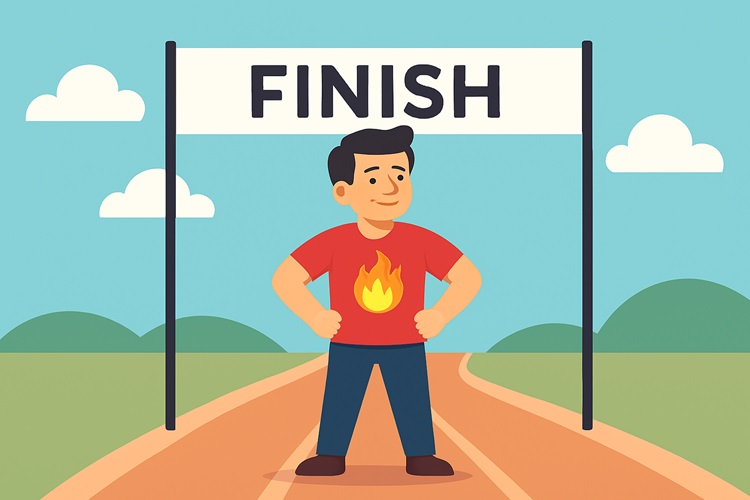The Effects of Negative Self-Talk on Your Finances (And How to Fix It)
Your mind has a constant inner chatter running in the background. Most of the time, you barely notice it. But when it comes to money, negative self-talk can quietly shape your financial reality in powerful ways.
When you think of money, what image comes to mind? Coins, cash, a bank balance. But what thought follows that image? Is it freedom and possibility — or stress, limitation, and “I can’t afford it”? That immediate reaction is your financial self-talk.
This isn’t just mental noise. The way you speak to yourself about money influences your decisions, your confidence, and ultimately your financial outcomes. To truly understand its effects, you have to look deeper at the beliefs driving those thoughts — something we’ll explore in this post.
We’ll examine how your inner dialogue connects to your current financial situation and, more importantly, what you can begin doing to shift it. Change may not be instant, but with awareness and consistent effort, it is possible. When I became aware of my own money beliefs, I finally understood why my financial reality looked the way it did — and how it was affecting the rest of my life. That realization is what this post aims to bring to light.
Change Your Inner Conversation – Neville Goddard’s Powerful Exercise
One of the authors who has given me profound insights into how our creative power works is Neville Goddard. In one of his books, I recently came across a powerful teaching about changing our inner conversations, which helped me address a few real-life situations. No matter how much we study the mind and the power of thoughts, it’s easy to overlook some of the most crucial principles.
What struck me as truly unique about this chapter on inner dialogue is the perspective it offers. While most personal development methods emphasize self-talk and focus mainly on what we think about ourselves (which is indeed important), Neville highlights another overlooked dimension. He explains that we must also pay attention to what we think about others, because our inner conversations about them might actually be influencing their behavior toward us.
This is something that requires careful reflection: What are our thoughts when we think about the people in our lives? Not just those who are very close to us, but also those who may seem less significant yet still play a role in our individual world. How often do we replay old dialogues with them in our minds—things they said that hurt us, words we wish we could say in response, or expectations we have of them? Believe it or not, this mental replay happens frequently. One key reason we might speak negatively about others behind their backs is that we carry a lot of unexpressed thoughts about them.
From early childhood, humans are taught to focus on external circumstances. Our usual response to hostile or challenging behavior has been either to distance ourselves from such individuals or confront them directly. While there is nothing inherently wrong with these approaches—and sometimes they are necessary—it is essential to understand that our inner state and the way we perceive the world are far more significant than the actions we take. Often, working on our beliefs and thoughts about others can lead to remarkable changes in our interactions and emotional well-being.
How to Create a Burning Desire to Achieve Your Goals
If you are interested in personal development, you probably already know the importance of having a burning desire to achieve your dreams. But here’s the real question: can a burning desire actually be created? In other words, is it possible to cultivate strong motivation by convincing yourself that a goal is so important you dedicate everything to it? Or is it necessary to discover your true purpose in life first, instead of chasing random goals?
These are the kinds of questions that often come up for people exploring success principles and the Law of Attraction. Both beginners and those who have studied and applied these methods for years sometimes find themselves doubting their goals. That’s because, over time, every desire tends to lose some of its original intensity—what feels urgent today may not matter as much in the future. That’s simply human nature. Still, we can only stay persistent in our efforts when a goal continues to feel meaningful. Otherwise, we keep changing direction midway, never fully reaching the destination we truly want.
That’s why in this post, I’ll share how to create a burning desire and the practical methods you can use to identify what you really want—two things that are deeply connected. But before we dive into the steps, let’s cover a few key concepts that will make the whole process much clearer. Continue reading
Dealing with False Hunger: 3 Common Types of Emotional Eating You Should Know
Are you eating less but still not seeing results in your weight loss journey? You might be unknowingly falling into the trap of false hunger—a pattern of eating not driven by physical need but by your emotional state. I know this because I’ve been there myself, thinking I was eating light, only to realize I was caught in mindless emotional eating habits that sabotaged all my progress.
Simply put, emotional eating is when we eat not to satisfy hunger but to feel better. Whether it’s a sweet treat after a stressful day or grabbing snacks at night out of boredom, these behaviors are incredibly common, especially among people facing emotional turbulence—both big and small.
Food companies know this well. That’s why they market products with feel-good messaging, reinforcing the idea that food equals happiness. But when we consistently use food to cope with emotions like stress, anger, loneliness, or anxiety, it becomes a serious concern—one that can lead to weight gain, poor health, and emotional dependence on food.
If you’re able to recognize that your hunger may be emotionally driven, consider yourself fortunate. Most people don’t even realize they’re eating to fill an emotional void. Emotional eating can take many forms—like snacking after meals, eating out of boredom, indulging in sweets late at night, or always needing something to munch on while watching TV.
Occasionally enjoying food for comfort is perfectly okay, but when this becomes your regular coping mechanism, it’s time to break the cycle. The more we try to “feed” an emotion, the more disconnected we become from our body’s real needs—and our health suffers silently.
In this post, we’ll take a deep look into the three most common types of emotional eating: midnight cravings, sugar/chocolate cravings, and mindless multitasking munching. You’ll also learn how to recognize these patterns and apply effective, mindful strategies to overcome them. If you’re serious about losing weight or regaining control over your health, identifying and dealing with false hunger is a game-changer. Continue reading
Lose Weight with the Law of Attraction: My Real-Life Manifestation Story
I have manifested weight loss not just once, but twice using the Law of Attraction. The first time, I lost around 25 kg (55 pounds), but I made a major mistake that caused me to gain the weight back. That experience taught me something very important: using the Law of Attraction to manifest your ideal body is not a one-dimensional process. It requires alignment across multiple areas of your life, especially your mindset, self-image, and your relationship with food and your body.
In this post, I will take you through the exact process that worked for me and what I learned along the way. We will explore how mind conditioning and self-image play a powerful role in achieving lasting weight loss. I will also share insights on understanding your body, building body awareness, and making better food choices, all from an energetic and intentional perspective.
While many people use the Law of Attraction to attract more money or improve relationships, few recognize how effective it can be for transforming physical appearance. Your body is a reflection of your inner beliefs, especially the subconscious thoughts you continue to repeat about yourself every day. Genetics certainly play a role, but so do your emotions, mindset, and daily habits.
If you have been stuck in a cycle of dieting and frustration, or if you have tried everything and still cannot lose the weight, this post may be exactly what you need to shift your energy and finally align with the body you truly desire. Continue reading
Think It’s Not the Right Time? How to Stop Procrastinating and Take Action Now!
Have you ever caught yourself thinking, “I’ll start when I’m more ready,” or “This just isn’t the right time”? If that sounds familiar, you’re not alone. Many of us put our dreams and goals on hold, not because we’re lazy or incapable, but because we’re waiting for the “perfect” moment that never comes.

But let’s be clear: this isn’t about the kind of perfectionism that pushes people to work harder and harder, often at the cost of their well-being. That type can lead to anxiety, burnout, and even depression.
What we’re talking about here is a quieter, more deceptive kind of perfectionism. It convinces us we need better timing, more resources, or improved skills before we can begin. And unfortunately, it often leads to the biggest hurdle in the path of success: procrastination.
This concept ties closely to a recent post I wrote titled 10 Effective Ways to Stop Procrastinating, where I explain how our minds trick us into believing that delays are justified. One of the key insights from that post is this: you don’t need to see the whole picture before you begin.
That leads us perfectly into the next topic:
One Step at a Time Continue reading
10 Effective Ways to Stop Procrastinating (Science-Based Hacks)
Procrastination affects everyone, from putting off workouts to missing deadlines. But it’s not about laziness. Research shows it’s often linked to anxiety, perfectionism, or lack of motivation. The good news? You can beat it. In this post, we’ll explore 10 proven, science-based strategies to stop procrastinating and take control of your time.
To some degree, we all procrastinate; it is in human nature. From children delaying their homework to adults postponing work, procrastination is often associated with laziness. However, this is not always true.
When procrastination becomes a person’s second nature, it can imply a deeper psychological issue. Conversely, the opposite behaviour can hint at conditions such as OCD, where people feel a compulsion to complete tasks immediately.
The habit of deliberately delaying tasks without any valid reason can significantly impact a person’s life in many ways. In fact, it can gradually evolve into a self-destructive pattern, resulting into missed opportunities. Severely affected individuals may also risk losing their jobs, damaging their relationships, and, most critically, jeopardising their physical and mental well-being.
That’s why I recommend seeking medical help and therapy, especially when procrastination reaches extreme levels but for moderate level you can use the mind hacks to stop procrastinating presented in this post.
It is a form of addiction, not a physical one, but a mental one. To someone who is not addicted to procrastination, it may appear as an insignificant issue, and they may think that the affected individual is doing it out of laziness. However, in reality, once you become addicted to postponing tasks, you have less control over your mind, much like people addicted to smoking or drinking.
I can relate to you if you are frustrated because you always keep putting off your tasks, and your mind tricks you into rescheduling your important work repeatedly. Don’t worry; I am going to provide you with 10 solutions based on human psychology and mind studies that you can use for overcoming procrastination.
Just read them and find out for yourself which of the following is an effective way to beat procrastination based on a trial-and-error approach, because only you can discover what works best for you. Continue reading
8 Reasons Why Self-Image Is Important
In this post, I will discuss several reasons why self-image is important so that you can get motivated to learn more about what it means and how it shapes your personality and life. I will also talk about how you can foster a healthy self-image, which can benefit both you and the people around you.
It is very common for people to hear about the importance of working on their self-esteem, confidence, and maintaining peace of mind. However, rarely do people talk about working on one’s self-image, which is, in fact, at the root of all these other aspects. Even though only a few people truly understand what self-image is, the bottom line is this: whether one is aware of how self-image works or not, it is always at play. It continually changes with one’s experiences and social factors, and much of it remains the same, originating from childhood—unless efforts are made to change it.
A successful person, however success is defined, is good at something because their psychology allows them to flourish in that particular area. The same is true for someone whose life feels miserable—it’s their self-image and mindset that influence their experience. I can’t emphasize enough how important it is to work on your self-image, but I’ll do my best to highlight its significance with these points. This will also give you a clearer picture of what this is all about:-
1 Your Opinion About Yourself
We all have opinions about everything in our lives, from what we watch on Netflix to the types of people we hang out with. We make these choices based on how they relate to us and form opinions around them. The more something matters to us, the more opinionated we become about it. This holds true for what we like, what we don’t like, and even what we don’t care about.
We are so attached to our views that it often takes a significant amount of external effort if someone badly wants to shift our perspective, even for a moment. What do you think it would take for you to change your opinion about yourself? Continue reading
Is Meditation or Mindfulness Making You Lazy? Debunking Myths and Finding Balance
I have often heard people say that while meditation helps them achieve mental peace and emotional control, they feel it negatively impacts their work. They describe becoming less driven or even a bit lazy after practicing mindfulness or other meditation techniques. While I understand that such experiences can happen, it’s essential to delve deeper to uncover the reasons behind these feelings.
Sometimes, people feel that meditation makes them less socially interactive or that they’re no longer as “fun” to be around. Others might even worry that these practices are making them less interesting as individuals.
The first thing to understand here is that the truth is not always what we perceive, we often judge ourselves too much when we are around others and begin to think thoughts that are not really relevant to the actual situation. It is like working out for a few days and feeling that you have not achieved any good results whereas any remark from others or even the slightest hint that you are not fit will make you think negatively about the activity altogether.
However, the key factor at play here is your “ego” or “psyche”—or what I prefer to call your “self-image.” I use this term frequently and delve into it extensively throughout my blog. There’s something within us—a kind of protective mechanism—that resists major changes in our lives. It works to maintain the status quo, as any change is often perceived as a potential threat to our sense of stability and familiarity. Continue reading
Mastering the 25-Minute Pomodoro Technique for Work and Studies
I have personally tried the 25-minute ‘Pomodoro technique’ and found it to be an effective method for tackling pending projects and tasks. It is a powerful tool for addressing procrastination. In this discussion, we will explore how to effectively use this time management method and evaluate its efficacy in promoting the timely completion of tasks.
The origins of this approach can be traced back to the 1980s when it was crafted by Francesco Cirillo, a prolific author in the field of time management. The method derived its name from the Italian word for “tomato” because Cirillo, during the process of testing and designing, relied on a tomato-shaped kitchen timer.
Furthermore, the Pomodoro technique has demonstrated its remarkable utility, particularly for students. It harnesses a psychological quirk that compels our minds to prioritize task completion when faced with a deadline, followed by a rewarding break.
This technique improves concentration and efficiency, which proves particularly advantageous for students looking to streamline their study habits. As it promotes the breaking down of tasks, it can be an invaluable tool for children as they prepare for exams, particularly for subjects that require memorization. Nonetheless, adults can also reap the advantages of this approach, which can prove to be a lifesaver for individuals facing work deadlines.
No matter what work you want to complete, whether it is as simple as something like cleaning your home or something related to your academics or profession, you can implement this technique to successfully finish the work on time.
Why is the Pomodoro Technique designed around a 25-minute time interval?
Research indicates that the typical human attention span, particularly for those aged 12 and above, falls within the range of 20 to 40 minutes. Francesco Cirillo, the creator of this method, developed it with a broad demographic in mind, and 25 minutes appears to strike a balance that accommodates all. This duration provides ample time for meaningful focus without leaving individuals feeling that no progress has been made, while simultaneously preventing distractions by being concise enough that anyone can commit to it for a mere 25 minutes.
From my experience with this technique, I can say that there is a psychological compulsion to resume the task at hand when we unconsciously sense that half an hour has passed. Specifically, I find that the 25-minute work period followed by a 5-minute break creates a perfect balance—there’s no overwhelming pressure from the clock, yet it ensures the break doesn’t extend too long, encouraging us to get back to work before another cycle begins.